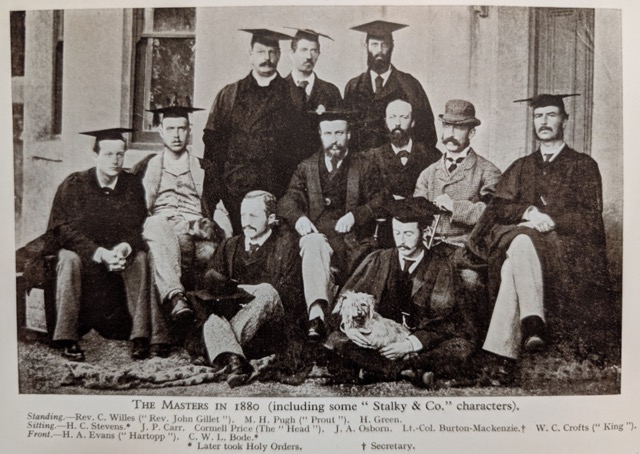Publication
As Andrew Rutherford explains (p. 254) this poem was one of the “Inscriptions” to presentation copies of Echoes and was presented to the Common Room of the United Services College, which Kipling attended from 1878 to 1882. In the presentation copy, now in the Kipling Collection at Dalhousie University Library (in Nova Scotia, Canada) the inscription is illustrated with a cartoon of the young Kipling handing in ‘lines’ done as a punishment.
It was published in the USC Chronicle, no. 41, 27 March 1889, and collected in the Outward Bound, de Luxe, Sussex (Vol 35 p. 24), and Burwash (Vol. 28) Editions, with the title
‘Inscribed in a Presentation Copy of “Echoes” to the Common Room’
and the subheading:
‘My very noble and approved good masters’.
It is also to be found in the Cambridge Edition (2013 Ed. Pinney) p. 1188. It is numbered
83B in ORG, p. 5057.
Although it is included in the Schoolboy Lyrics section of the Outward Bound and de Luxe editions, it was not one of the original poems collected together by Alice Kipling for publication in Lahore in 1881.
The poem
The young poet, who over his years at school had been used to handing in his work to exacting masters who never hesitated to wield their red and blue pencils on his errors, asks their approval for a collection of his verses. Placetne, Domini?— ‘Does it please you, my masters ?’, he asks.
Kipling had left school some seven years before, but he was still only twenty-three. He greatly valued his time at USC, and the school itself, to the end of his days. See “An English School” (1893) and Stalky & Co. (1899).
Notes on the Text
[Title] the Common Room This was the masters’ sanctuary where they could relax between classes, talk together, spar with each other, and do some work themselves with their blue and red pencils.
[Verse 1]
proses in this context the translation of Latin text into English, an interesting example is Kipling’s poem Donec Gratus Eram.
[Verse 2]
Blue-pencil X the master will read the written work submitted by the pupil and indicate his disapproval where necessary. He occasionally uses a red pencil, see Verse 3.
constructions queer Constructions in classical studies are arrangements of words in accordance with established usage. Kipling’s were often unconventional, and marked as such with blue-pencil X’s.
wondrous words Kipling read omnivorously in his schooldays, and had the run of the Head’s library. In “Slaves of the Lamp” Part I in Stalky & Co. (p. 46) he describes his alter ego “Beetle” reading quarter-comprehended verses so may well have misused expressions he did not fully understand. See also
“Regulus” (A Diversity of Creatures p. 239)
[Verse 3]
Red-pencil used for corrections as in verse 2.
in the silence of the schools, with lines to do When the other boys are outside playing sports.
‘Impositions’, known as ‘impots’, were usually lines of Latin verse to be copied out and handed in by a certain time as a punishment for transgression. There are many mentions in the ‘Stalky’ stories. They are done in the ‘silence of the schools’ because the only time available is when the other boys are outside playing sports. Kipling notes the unfairness of this:
A Master could load you with an imposition to be shown up at a certain hour, which, of course, prevented you from playing and so secured you a licking (a beating, for missing games) in addition to the imposition.
( “An English School”, Land and Sea Tales pp. 263-4).
This school rule forms a large part of the plot of “Regulus”.
[Verse 4]
Latin Primer a text-book of grammar and the use of the Latin language.
Kennedy’s Latin Primer was a familiar work to generations of British schoolboys and schoolgirls.
[Verse 5]
laymen in this context men and women who are not in Holy Orders. The expression can also be applied to non-members of a profession, as when Kipling said in his address to the Middlesex Hospital in London in 1908 that mankind was divided into doctors and patients. See
“A Doctor’s Work” (A Book of Words).
divines in this context men in Holy Orders who had been ordained as priests. In Kipling’s day many schoolmasters and many Heads were in Holy Orders. At USC, in addition to the school Chaplain, Stevens, the original of Macrae in Stalky & Co. was in Holy Orders, as was Evans, the original of “Hartopp”, and “Mason”. The head, Cormell Price, was a layman. The chaplain, referred to as “The Reverend John” in the opening passages of “The Moral Reformers”, was held in great regard by Stalky & Co., though they were against clerical head masters. See “Stalky & Co.” p. 131.
lines impositions, see Verse 3.
©John McGivering and John Radcliffe 2017 All rights reserved
